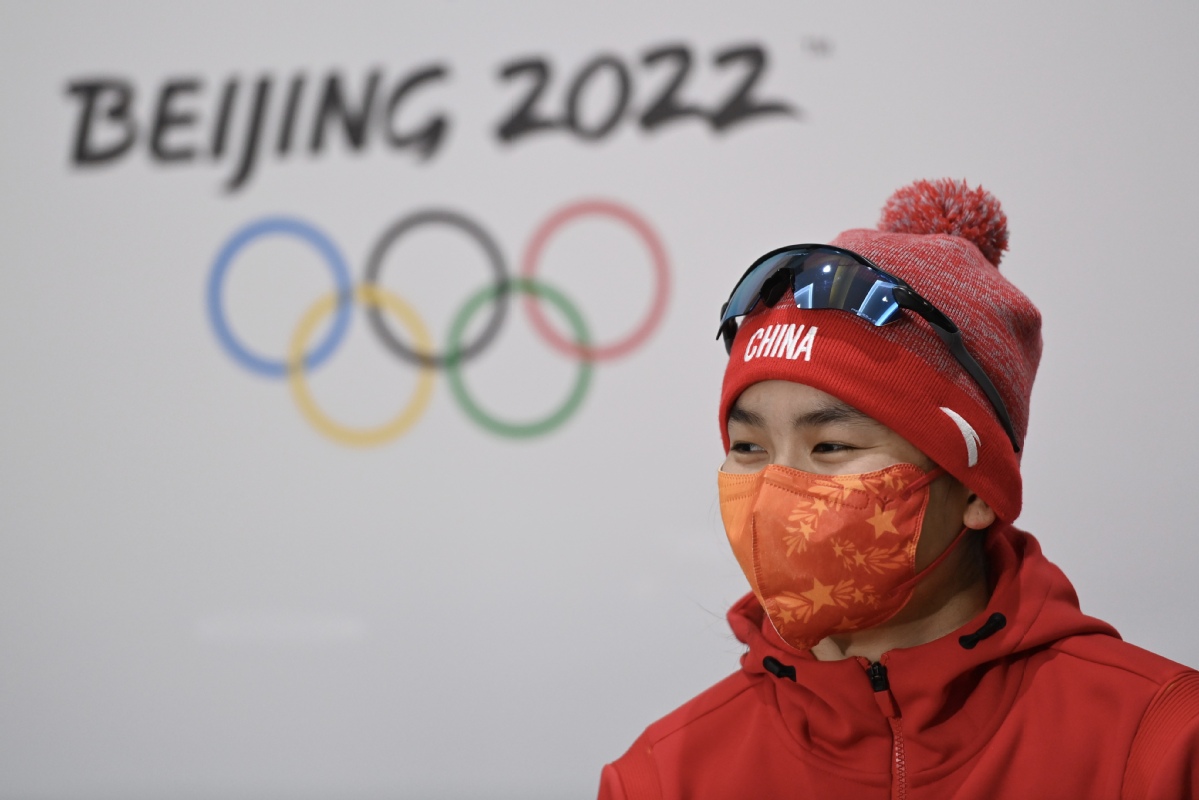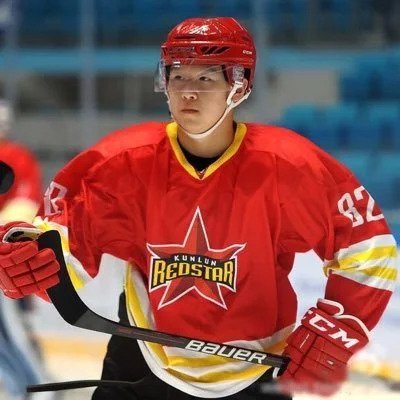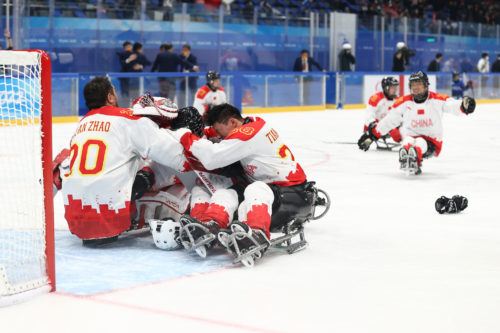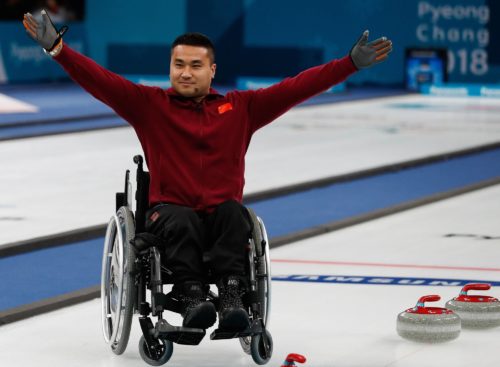Uyghur torch bearer dropped from China’s relay team
An update on Dinigeer Yilamujiang, plus an honest assessment on the state of Chinese ice hockey in this special edition of the China Sports Insider Podcast.

Dinigeer Yilamujiang (Dilnigar Ilhamjan), one of the two final torch bearers during the opening ceremony, was excluded from the women’s 4 x 5 km relay team on Saturday. China ended up finishing 10th in the 18-team race, setting a new team record at 57:49:7.
It's possible, of course, that others have been selected above her on form/merit, but we're told she was chosen as a torch bearer because of her "achievements", so something doesn't add up… https://t.co/EBrrKQ1dWb
— Mark Dreyer (@DreyerChina) February 12, 2022
In today’s special edition of the China Sports Insider Podcast, hosts Mark Dreyer and Haig Balian begin by discussing Yilamujiang (also known as Dilnigar Ilhamjan), the 20-year-old ethnic Uyghur from Xinjiang who was thrust from obscurity into the global spotlight during the opening ceremony — she then competed in a 7.5 km x 7.5 km skiathlon event, finishing 43rd out of 65 — before receding into obscurity again.

Dreyer and Balian then talk hockey. The Chinese men’s team, full of heritage players of non-Chinese nationality, scored two goals against reigning silver-medalist Germany on Saturday — “These are the first Olympic goals that China has ever scored,” Dreyer notes, “and someone made the point to me that they may be the last they score for a while.” Sandwiching that game, China lost 8-0 to the U.S. and 5-0 to Canada.
And finally, the guys discuss a strange incident at a news conference last week, when Chinese women’s hockey goalie Kim Newell was prevented from speaking English. What’s up with that?
We’ve excerpted the transcript of the episode up to this point. Click below to listen to the entire show.
Mark Dreyer (2:42): Dinigeer Yilamujiang, known to virtually no one inside or outside of China just about 10 days ago, was of course one of the two final torch bearers, picked almost certainly because of her Uyghur ethnicity. The narrative is that she is from Altay in Xinjiang, which is where China claims is the birthplace of skiing. And she’s a young, promising athlete. I’ve spoken to the coaches and she _is_ a young, promising athlete — like dozens of other people on this team, and hundreds of other people in the country. Her results so far, as we expected — she hasn’t gotten near the podium. Her best was a 43rd place in one of her cross-country races.
Now, I know that she was down to race in the relay and China figured they might have the potential for a top-eight finish in a women’s 4 x 5 km sprint relay. She was down for the first leg, but when the start list came out yesterday, I noticed that her name was not there. The athlete who replaced her actually had worse results earlier in the week, so that just seems strange to me. It didn’t really add up.
Anyway, I tweeted to journalists because I know there’s been a lot of interest in her — she previously walked through the mixed zone area after her races, so no one had a chance to ask her anything about anything at all, which was sort of against the usual protocol. Word came back and the phrase that was used was, “She’s done — physically and mentally.”
I think that tells you everything we need to know. She’s had the eyes of the world on her and probably felt like she’s been hounded into hiding to a certain extent. And who knows what’s been going on inside the team? It must have been a very tough situation for her, and maybe at some point, we’ll get her story, but it certainly looks like it’s not going to be this week.
Haig Balian: This is a fascinating story and we will definitely be watching to see what happens with her.
Like you, Mark, I was glued to the TV on Thursday to watch USA vs. China in men’s hockey. For you especially, this has been a long time coming. What was it like for you finally watching China play?
Mark Dreyer: There have been so many ups and downs. I’ve been following the team for years — actually since the start of the Kunlun Red Star franchise in 2016-2017. But then, really, how the Olympic squad was coming together got on my radar last spring. At that point it was looking like it was going to be a bunch of Chinese youngsters against NHL All Stars, and thank goodness it wasn’t because what we had was the bolstered Chinese team with a majority of import and heritage players recruited from North America playing against college kids in the U.S. and a few former pros — and it was still 8-0 to the U.S. So imagine what it _could_ have been like. All those predictions about a massacre — I don’t think they were too far.
Haig Balian: For anyone who does not follow hockey, 8-0 is an absolute shellacking.
Mark Dreyer: If you look at the shot count, which is also indicative of the balance of play, I think the U.S. team — did they get up to 60? Or maybe just the high 50s. [Editor’s note: 55 shots for the U.S., 29 for China; the last time the U.S. scored eight in the Olympics was 2002.] And I think China had far less, so it wasn’t like they got unlucky with the scoreline. I was kind of disappointed to be honest.
Haig Balian: This is aimed not at you, but to everybody else out there listening, because there are many, many reasons to follow you on Twitter, but one of my favorite versions of you on Twitter is when you just go whole hog on your disappointment on any subject. And you really went after this team.
The fact that the Americans didn't really celebrate that goal tells you everything you need to know about where we are right now. Just as well most Chinese fans typically leave after the second "half"…
— Mark Dreyer (@DreyerChina) February 10, 2022
What was it that you saw in this display?
Mark Dreyer: You know what, I know a lot of the players, and I feel like I know the other ones, because I’ve been following them so closely. I wanted China to perform. I didn’t think that they were going to win. They were definitely overmatched on paper, but they just didn’t really show… some of the comments afterwards were like, “We’re really enjoying being here at the Olympics.” And is that really what you want to hear? Like, yeah, enjoy the Olympics in the 10 days beforehand, but then give it everything on the ice. There was the clip from Brandon Yip in a clip that kind of went semi-viral where he said to the team, “Let’s go and fucking shock the world.”
This did not happen. China did not shock the world, f-bomb or otherwise. pic.twitter.com/VckpOvmDag
— Mark Dreyer (@DreyerChina) February 11, 2022
Haig Balian: Well did they shock the world?
Mark Dreyer: Unfortunately, they didn’t. If you look at the ice time, the Chinese players barely got on the ice at all.
Haig Balian: So this is the point that I want to bring up with you, because in that Twitter thread you mentioned that the team protected their homegrown players. What do you mean by protecting?
Mark Dreyer: Well, basically, a good hockey team plays everyone roughly equal ice time. So you have four lines and you’re constantly rotating, giving players 45-second bursts of everything they have, and then they know they have another three sessions where the other lines take your place so they can rest. You’re constantly subbing in and out. If you are only playing three lines, because the fourth line is effectively sitting on the bench and not being used, then the other players are going to get tired by the end of the game — certainly compared with the opposition.
And that’s what happened. Clearly the coach doesn’t think that the Chinese players are at the equal level of the import players and the heritage players — the North Americans, effectively. That’s his call, and he knows them better than anyone. But there’s consequences to that. I also think if you’re watching as a Chinese fan of sports, or a hockey fan, if you’re thinking, “Why aren’t our players, our homegrown players, getting a chance? The other guys are losing 8-0, at least throw our kids on and give them an opportunity,” it can create a little bit of a backlash. And we saw that with some videos I noticed going around online, highlighting the fact that there are all these naturalized players.
You want China to embrace the whole team and not to divide this group and that group, and I don’t think the coach’s actions were conducive to that. Maybe it would have been 10-0, maybe it would have been worse if the Chinese players played more. But that was just one factor.
Haig Balian: It was a much more competitive game against Germany. What did you see in that game?
Mark Dreyer: Well, there was some real fight. I mean, they were 3-0 down and we thought, “Here we go again.” Now Germany — people might look at that group if they don’t know hockey and think that the U.S. and Canada are far and away the best. But Germany, when the NHL players didn’t play four years ago, won the silver medal, and they have some great players in there. So to come back and score two goals — it was 3-2 to Germany in the end — and to make it a competitive game, the German players knew they were in a game, that’s for sure.
These are the first Olympic goals that China has ever scored, and someone made the point to me that they may be the last they score for a while, because, to be honest, Canada’s going be a tough game, and I can’t see China qualifying for the Olympics four years from now. There’s a long way to go, but where hockey is right now, [China was] in because they lobbied for it as the host nation, but they gave a good account of themselves. It was too bad that the Germany game wasn’t first, because I think it probably would have given the team a bit more confidence.
[Editor’s Note: Canada beat China 5-0 on Sunday. These teams will play again on Tuesday for a spot in the quarterfinals.]
Haig Balian: On the women’s side, there was a really strange moment after the Chinese women played Japan last week at a press conference. Their goalie Kim Newell, who was born in Canada and lives in Vancouver, was asked if she could answer a few questions in English. And according to Reuters, an aide next to Newell interrupted and said, “She’s not allowed to speak English, I will try to translate for her.” And then you had her answer questions in Mandarin, with the aide translating, but seemingly asking Newell for help in the translation. So Mark, I have to ask you, not for the first time and probably not the last time — what the hell?
Mark Dreyer: I mean, it was a ridiculous situation. She’s allowed to be bilingual! And she’s a great story. She’s been to Princeton, super smart girl. She learned Chinese so that she could communicate with her Chinese grandmother. She had a really nice story about going back to her grandmother’s roots in Shenzhen, a village near there. But, of course, a week before the tournament, China decided that all the import players would suddenly be given Chinese names. And so she was asked about her Chinese name, Zhou Jiaying, and how she chose it. The translator was trying to give the translation of her answer about what it meant. And Kim at one point whispered “auspicious,” so they changed the translation.
It was kind of ridiculous. Why can’t she speak two languages? Eileen Gu, for example, wasn’t asked to only answer in Chinese. That would have been a much bigger story. It was just one of those stupid things where someone said, “You’ve got to speak in Chinese.” Because the heritage players who aren’t able to speak Chinese were still able to give interviews: we saw Jeremy Smith, who can’t speak Chinese, on the men’s side speaking in English, so that wasn’t a problem. It was just kind of funny that she was doing a better job than the translator.
Click through for show notes from the most recent episode of the China Sports Insider Podcast. More Beijing 2022 coverage is here.





